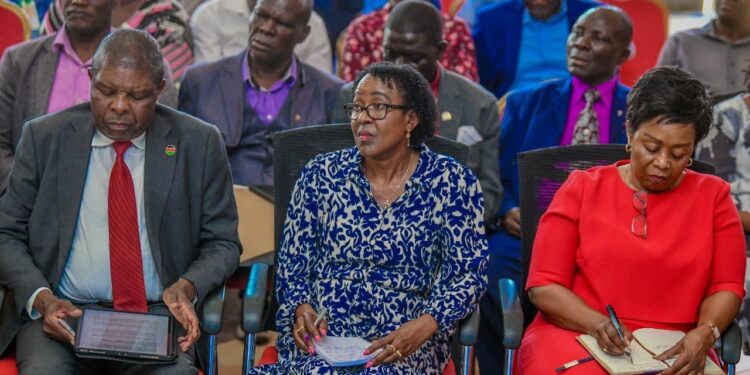The Ministry of Foreign and Diaspora Affairs has launched the Foreign Policy Mashinani initiative, an inaugural programme seeking to bring Kenya’s foreign policy to the grassroots.
The initiative, which was recommended in the Sessional Paper No.1 of 2025 on the Foreign Policy of the Republic of Kenya, was launched at the Mama Grace Onyango Cultural Centre in Kisumu on Tuesday.
It is intended to open a new chapter in people-centred diplomacy, turning abstract policy into real conversations about livelihoods, investment, and opportunity, the ministry said.
Officials at the ministry said the goal is to ensure that every Kenyan appreciates that diplomacy is no longer distant or abstract, but a living process that shapes jobs, trade, culture, and security, and affects people’s daily lives.
The Sessional Paper on the Kenya Foreign, which reviewed the 2014 Foreign Policy document, noted that lack of an effective strategic communication of the activities and achievements in the diplomatic sphere had attracted criticism and misinformation. It further noted that the ineffective communication had alienated citizens from the foreign affairs of the country.
“There is a need to develop appropriate methods for effective engagement with the media; increase the visibility of the country’s diplomatic milestones; enhance and promote public diplomacy; expansion of communication channels to enhance and maintain a positive image of the country; and developing strategic communication and publicity for the Foreign Policy document to reach broad sectors of the nation and people,” the sessional paper noted.
Consequently, the policy recommended Foreign Policy Mashinani and Diaspora Policy Mashinani as tools for strategic communication and public awareness.
“Foreign Policy Mashinani will be undertaken across the country to ensure Kenyans engage with the document and connect with the Foreign Policy of the Republic of Kenya,” it said.
It added that the expansion of the communication strategy and public awareness would also include the sensitization of the diaspora policy.
Other strategies of localizing the foreign policy is to translate the Foreign Affairs and Diaspora Affairs 2024 documents as well as Information booklets of the ministry into Kiswahili.
“This will enable the citizens to understand and appreciate the role of foreign policy in the daily lives, in the sustainable development and prosperity of our country,” it noted.
The launch in Kisumu is thus expected to set the stage for similar forums in other counties as the ministry continues to roll out the initiative nationwide.
MFA Director General Amb. Josphat Maikara termed the Kisumu forum as “a historic first interface between the Ministry, the county government, and the people.”
Amb Maikara added that the dialogues will signify a shift in Kenya’s diplomatic thinking, from centralised decision-making to inclusive engagement with county governments as espoused under the government’s Bottom-Up Economic Transformation Agenda. Under the initiative, he said, foreign policy is envisioned as a tool to open local economies for global partnerships that benefit the citizens.
Acting Director General for Political and Diplomatic Affairs Amb Lucy Kiruthu said the vision behind the programme is to onboard counties as co-creators and co-implementors of Kenya’s diplomacy, which is no longer the preserve of the Executive”.
What happens abroad must make sense to the farmer, the fisherfolk as well as the youth seeking opportunity at home,”Amb Kiruthu, who is headed to Thailand as the envoy, said.
Kiruthu added that localization of the Kenya Foreign Policy at the grassroots would also assist citizens make sense out of the President’s foreign visits, which have often been criticized.
She noted that Kenya’s diplomacy remained most visible through presidential engagements abroad.
“Each international trip by the President opens markets, attracts investors, and deepens cooperation that eventually trickles down to the counties. This is the conversation that seeks to help citizens understand the actualisation of foreign policy, Kiruthu said.
Kisumu, she added, was chosen as the pilot county because of its strategic position as aligned to the thematic area of Ocean and Blue economy diplomacy, with untapped industrial and tourism potential as well as its border proximity with Uganda and Tanzania.
Regarding Kenyans living and working abroad, Secretary for Diaspora and Welfare Affairs Amb Hellen Gichuhi said the public engagement would help create stronger awareness at the grassroots level to prevent human trafficking and unregulated remittances.
Gichuhi noted that the sensitization would help end exploitative recruitment, while encouraging county governments to partner to establish information centres for prospective migrant workers.
Noting that the diaspora contributes the largest share of foreign-exchange inflows at Sh4.6 billion, Gichuhi said the State Department for Diaspora Affairs remains committed to ensuring safe migration, protection of migrant workers, and structured diaspora investment.
“Our focus is on ensuring that migration is protected, ethical, and beneficial to all. We are also mapping investment opportunities for Kenyans abroad and encouraging them to partner directly with counties through cooperative ventures, medical camps, and skills-transfer programmes,” Amb Gichuhi said.














